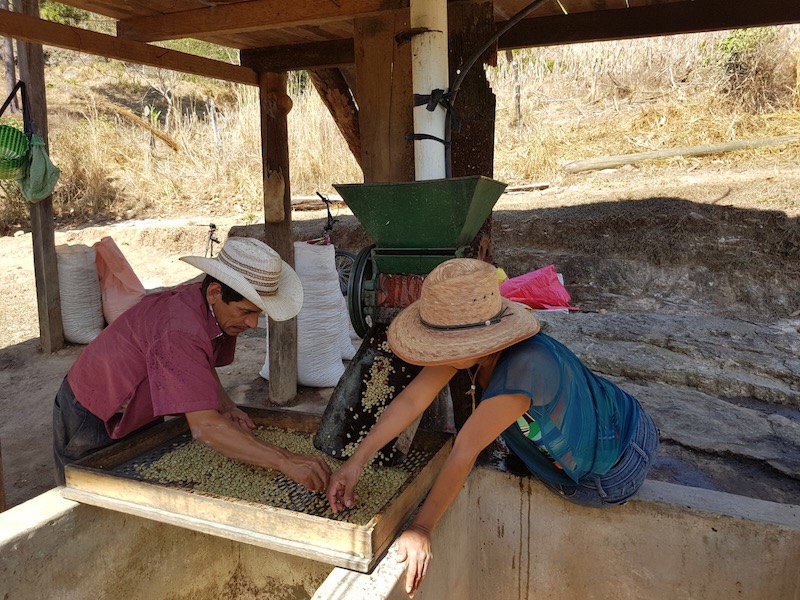Our Holiday Gift Set: Coffee Collectives
Three farming communities show how coffee changes lives
This holiday season, we’re highlighting three farming communities whose commitment to the environment and people make us proud. Spanning the coffee-producing world, from Honduras to Uganda to Myanmar, each community makes use of its natural resources with ingenuity to produce the most beautiful coffees while helping, rather than harming, the land and people who tend it.
Coffee with a Conscience
The Kaproron parish on Mt. Elgon, Uganda
The Kaproron parish on Mt. Elgon, Uganda
Every coffee-farming community looks different. On paper, the three we’re featuring in our holiday gift set, Coffee Collectives, certainly do. Catracha Coffee Project in Santa Elena, Honduras has one-hundred farmers, while the farmers belonging to Sipi Falls Wet Mill are eight-thousand members strong. In Myanmar’s southern Shan State, the villagers of Pha Yar Gyi Gone villagenatural process their coffee, laying whole cherry out to dry, whereas the producers on Uganda’s Mt. Elgon remove a portion of the cherry to achieve a gorgeously sweet honey-processed coffee. What the three collectives have in common is the recognition that coffee farming is a viable livelihood only when the soil is fertile and the water is clean. Long-term threats, like climate change, are only surmountable if the land itself is resilient, and the people who farm it have the necessary tools to grow the healthiest coffee trees and process the coffee cherry according to the highest standards. Specialty coffee is always hard work, but these farmers look that reality squarely in the face, and prove time and again that they’re up for the challenge.
Sustainable Coffee Starts with Knowledge
Catracha farmer-members, Mateo and Doris Benitez
Catracha farmer-members, Mateo and Doris Benitez
We’ve been buying from Catracha Coffee Company for seven years now. Mayra Orellana-Powell, native to Santa Elena, was working for coffee importer, Royal Coffee, when she started Catracha as a way to connect farmers to the specialty market. To do this, she helped farmers build the capacity to farm differently by picking cherry more selectively and wet processing coffee according to best practices. With the additional money that the community now earns, they’re reinvesting in the land, building basins to store processing water that's later used as fertilizer, and teaching pruning techniques that make coffee trees more impervious to diseases like coffee leaf rust, or roya, which are becoming tenacious with climate change.
Drying racks in southern Shan State, Myanmar
The farmers of Pha Yar Gyi Gone village are engaged in similar grassroots efforts, though it’s all the more remarkable because Myanmar, up until a few years ago, had never been considered a source of specialty-grade coffee. The farmers in southern Shan State partnered with international aid organizations and Coffee Quality Institute (CQI) to identify coffee as a potential path to economic security. After a cascade training initiative, in which a few farmers learned from CQI experts and then trained other farmers, an estimated 17,000 farmers learned new cultivation and processing techniques. Integral to the training was an emphasis on gender parity. Women, who often make up the majority of pickers, were given an equal stake in the project, sharing the potential profits equally with men. After considering the region's prolonged dry season, when the earth becomes a parched, dusty expanse, natural processing emerged as the sensible way to transform just-picked cherry into coffee, for it relies upon the sun, rather than copious amounts of water, to help the coffee seed detach from the fibrous fruit. Farmers use local reeds to make drying racks, and once the rainy season comes, they turn those reeds into fuel. Nothing is wasted, and ultimately, a stunning coffee—far more expressive than anyone expected—has emerged.
Trailblazers in Their Communities—and Beyond
Sipi Falls was the first wet mill in all of Africa to gain certification—a feat that’s all the more remarkable because it means that all of its eight-thousand farmer-members adhere to organic standards. But Sipi Falls doesn’t stop there. It filters its processing water to remove pollutants that might seep into the watershed, and farmers, in addition to maintaining gorgeously rich volcanic soil, also use biodigesters (a method that turns bio-waste, like food scraps, into fuel) in their homes for cooking.
Just imagine if we, as coffee consumers, could harness the same resolve as these three coffee collectives, turning each question of sustainability like a ripe coffee cherry in our hands, until we reached a solution that takes everything, from our limited natural resources to our long-term health and our high standard of beauty—into account.
With this gift set, Coffee Collectives, we are inspired to try our best to do just that.






